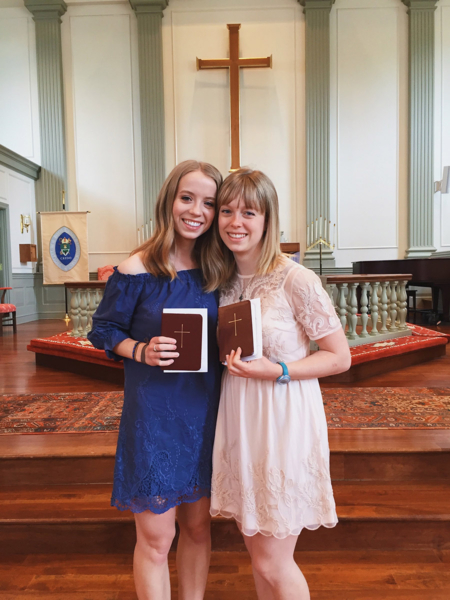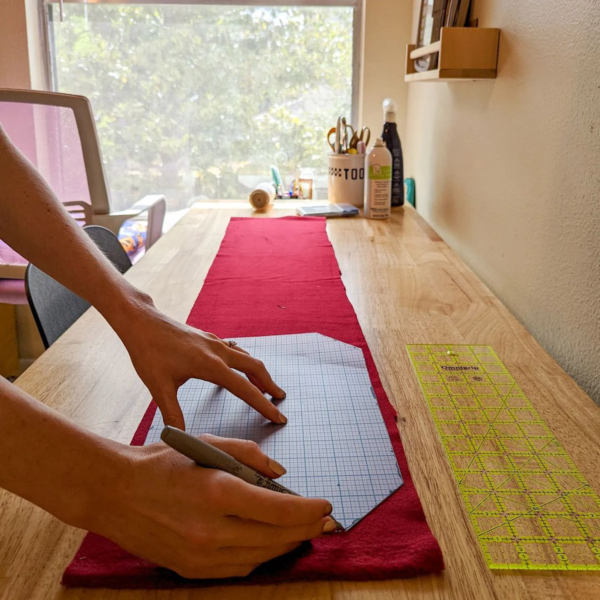Young adults engage with faith, build community outside church wallsPosted Apr 4, 2023 |
|

Sisters Annie Hodges, left, and Kate Greer, right, were confirmed in The Episcopal Church together as young adults in 2017. Their conversations about faith during and afterward inspired the podcast “The Average Episcopalian.” Photo: Courtesy Annie Hodges
[Episcopal News Service] When sisters Annie Hodges and Kate Greer decided during college that they wanted to be confirmed together, they started to talk about faith. They didn’t stop after confirmation.
“We talked on the phone a lot during COVID when we couldn’t be together or at church in person,” Greer said.
Between heavy and light-hearted conversations, “We would crack each other up and be like ‘People need to hear this,’” Hodges said.
Although she originally meant that jokingly, Hodges also knew that some young Episcopalians didn’t share the same fellowship as she and Greer. Statistics about the decline in church attendance in the United States reflect the near absence of twentysomethings — an estimated 31% of people raised Christian disaffiliate between the ages of 15 to 29 — at some Episcopal churches on Sunday mornings.
In 2021, the sisters turned their conversations into a podcast called “The Average Episcopalian.” Their project is one example of how young adults engage with faith and each other outside the walls of the church.
“One way that you grow in faith is by growing in relationship with other people,” Hodges said.
The podcast has established an online community where young Episcopalians can connect. “There was a big hole there where people who were Episcopalians and in their 20s weren’t talking to each other,” Greer said. To further fill the hole, Hodges and Greer created an Instagram account for the podcast to help listeners connect with them and each other.
Moreover, the podcast helped the sisters realize that their project is not the only online community of its kind. “You just have to dig a little bit,” Hodges said.
Ellie Singer, another young adult Episcopalian, also found a unique opportunity to engage with faith with the help of an online community.
A lifelong sewer, Singer learned how to sew a plush “Book of Common Prayer” for fun in 2020. She shared her creation with other Anglicans and Episcopalians on Twitter, and when the comments informed her that “no one else had done a project like this,” Singer created the Common Prayer Shop. Now she makes and sells Christian goods for other Episcopalians interested in tangible representations of faith.
“The community that crops up online is definitely helpful for sharing the joy in this kind of work,” she said.

Ellie Singer sells handmade plush “Book of Common Prayer” pillows and other items of interest to Episcopalians. Singer said sewing was a “kinetic form of prayer” for her. Photo: Courtesy of Ellie Singer
Running the shop also is a way Singer practices faith and environmental stewardship outside the Sabbath. “For me, sewing has become a form of prayer outside of Sundays,” she said.
Singer also engages with the church through faith-based climate activism. She represented Presiding Bishop Michael Curry as part of the church’s delegation at the 2021 United Nations Climate Change Conference (COP26), where she was reminded of how “very, very small” The Episcopal Church is.
“There are a thousand other ways to do what we do,” Singer said about The Episcopal Church’s social and environmental justice advocacy priorities. By serving on the presiding bishop’s delegation, Singer saw that when churches work with other institutions wanting to serve the world at large, they strengthen their own communities.
“Faith brings rootedness between members of the church and between the church and others in intersectional spaces like that,” she said.
Other young adults pursue opportunities to connect with The Episcopal Church outside church walls through the Episcopal Service Corps, which places them at nonprofit and community-based organizations addressing social issues. While learning how faith fits into social justice, fellows also live together, learning to deepen relationships with each other and their communities through faith.
Stephanie Whitehouse, who served in the Colorado Episcopal Service Corps from 2020 to 2021, said she engaged with faith more deeply than she had during routine Sundays.
“It was an embodied part of faith that I don’t think I had really experienced in my upbringing,” she said. “There’s something unique and sacred about showing up on a Sunday and doing liturgy and standing up and sitting down, but when the church is embodied, every day is different, and that is practicing what is being preached.”
Teagan Sage is a current fellow in the New York Service and Justice Collaborative, another branch of the Episcopal Service Corps. While Sage initially connected with the church through his previous congregation, “It was hard to find someone under 40, and there wasn’t a ton of diversity,” he said.
Now, Sage engages with other young Episcopalians in his daily life. He also engages with fellows in his corps who do not identify as Episcopalians or even Christians. These fellows particularly have helped teach Sage how to live as an Episcopalian in all parts of his life.
“Interfaith exploration and conversation have been some of the greatest factors in strengthening my faith,” he said. “I’ve found myself the most inspired by hearing people of other faiths talk about Jesus. It’s like seeing that spark but through someone else’s lens.”
Young Episcopalians say experiences with the church outside the church building have shown them how, by working in and with communities at large, the church can naturally engage other young adults seeking to grow their faith alongside other things that matter to them.
“Our generation is action-oriented,” Whitehouse said. “We want to know that we are making a difference with the effort we put into the connections we make.”
Sage said, “I think that through action we’re going to see all the benefits, since actions will speak for themselves.”
Listener feedback has instilled hope in Hodges and Greer, they said, about the endurance of the traditional Episcopal liturgy alongside new forms of worship..
“There are so many people we interact with in our online community who are so passionate about the liturgy that I think the passion and the appreciation for the traditions we hold onto are characteristic among people who decide The Episcopal Church is the place they want to be,” Greer said.
Although young Episcopalians find value in communities of faith apart from their individual churches, they still see participation in Sunday worship services as a foundation upon which they can live out their Sundays during the rest of the week. Singer believes that as an intergenerational space, the church provides a unique opportunity for Episcopalians of all ages to push forward together.
“Church is still where I’ve found consolation and support for the hardships I encounter as a young person,” she said. “I have this community of elders who give me wisdom and other support, and I think that’s something young people are hungry for and need.”
Whitehouse said, “Working in intergenerational space, as young people, is still absolutely necessary to move the church forward. There’s so much to be learned in this space, and what is faith if not always learning, always evolving, always changing?”
-Sarah Trombetti is a writer and cradle Episcopalian. She recently graduated from The Ohio State University.

Social Menu